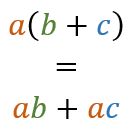Power of mathematics: Reasoning about functional types

One of the most amazing aspects of mathematics is that it applies to such a wide range of areas. The same mathematical rules can be applied to completely different objects (say, forces in physics or markets in economics) and they work exactly the same way.
In this article, we'll look at one such fascinating use of mathematics - we'll use elementary school algebra to reason about functional data types.
In functional programming, the best way to start solving a problem is to think about the data types that are needed to represent the data that you will be working with. This gives you a simple starting point and a great tool to communicate and develop your ideas. I call this approach Type-First Development and I wrote about it earlier, so I won't repeat that here.
The two most elementary types in functional languages are tuples (also called pairs or product types) and discriminated unions (also called algebraic data types, case classes or sum types). It turns out that these two types are closely related to multiplication and addition in algebra...
Published: Tuesday, 14 May 2013, 5:54 PM
Tags:
f#, research, functional programming
Read the complete article